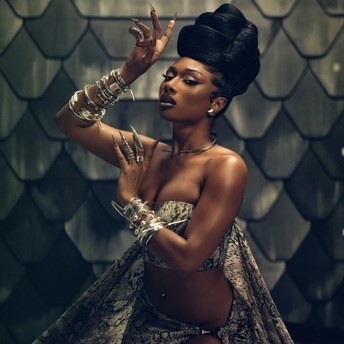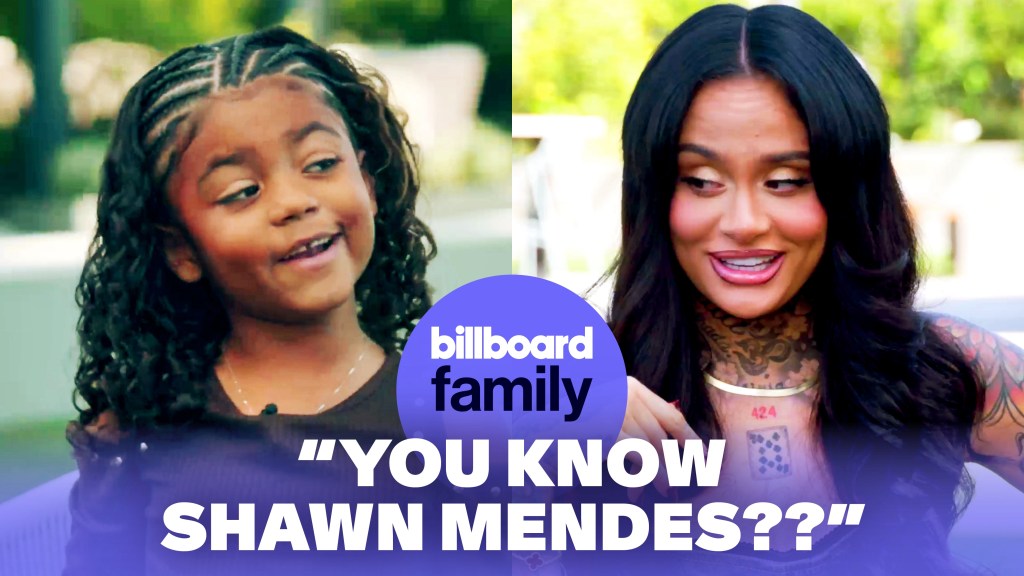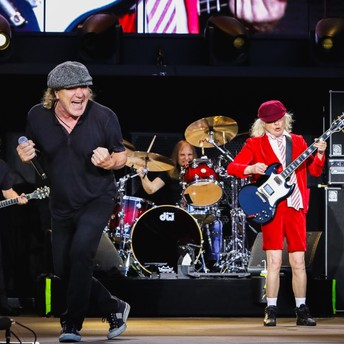Music News
Page: 56

Trending on Billboard
There’s a reason Little Monsters call Lady Gaga “mother.” At a recent show on her Mayhem Ball tour, the superstar stopped mid-song and paused her performance for several minutes to help care for a fan in need of medical attention and water.
In a video shared to X pegging the moment to Gaga’s Tuesday (Nov. 11) concert in Antwerp, Belgium, the hitmaker sits at her piano while belting out a stripped-back version of “The Edge of Glory.” After hearing fans in the crowd cry for help, however, she immediately called for a time-out.
“Stop, stop, stop. Is everyone OK?” she says in the clip, instructing the crowd to keep quiet while directing crew members to get water. “Just wait one second everyone. If everyone could wait patiently, just so we can make sure they’re OK.”
“Let’s get her backstage and take care of her backstage,” Gaga continues in reference to the fan in need, causing a few surprised murmurs from others in the audience. “If everyone could just stay quiet for a moment please, thank you.”
As the struggling concertgoer was shepherded away, the 14-time Grammy winner called after her, “I hope you feel better.”
Promptly jumping back into her performance of “Edge of Glory” on piano, Gaga added between lyrics, “There’s a lot that’s more important than show business.”
The Antwerp concert comes toward the end of Mother Monster’s run of European shows on her Mayhem Ball trek. After a handful of performances in France, she’ll close out 2025 with an Australian leg.
Next year, Gaga will take the tour through Japan before doing one last victory lap through the United States and Canada in February, March and April.
The show follows on the heels of the Grammys unveiling its list of 2026 nominees, on which Gaga’s name appears quite a bit. The icon picked up a total of seven nods, coming second only to Kendrick Lamar, who scored nine. Among them are song and record of the year for “Abracadabra,” while her Billboard 200-topping album Mayhem is up for album of the year.
Trending on Billboard
Rapper Adamn Killa (born Adam Kelly) was briefly detained after attempting his viral “ohh, arrest me, daddy” prank on Chicago police officers earlier this week.
Killa hopped in front of cops and hit his signature line in Downtown Chicago on Monday afternoon (Nov. 10) and according to the Chicago Sun-Times, he was handcuffed and detained in the back of a police car for about 20 minutes for allegedly interrupting a traffic stop.
Explore
See latest videos, charts and news
“I got out and I went and made more ‘Arrest me, daddy’ videos right after,” the Chicago native told the Sun-Times.
Killa, who’s managed by Chance The Rapper’s brother, Taylor Bennett, didn’t waste any time capitalizing on the moment by posting footage of his encounter with law enforcement on Instagram for his 781,000 followers to see. Soundtracked by his own track “Fall On,” the clip features him being handcuffed by police and placed in the back of a paddy wagon. Fortunately for Killa, he was released a short time later.
It’s far from the first time Killa has attempted to troll police officers across Chicago with his viral “arrest me, daddy” prank and signature taunting dance.
The 29-year-old has also used his prank as a form of protesting the Trump administration’s mass deportation campaign while trolling officers and ICE agents around Chicago.
“How they be covering their face and s—t, I feel like in the future, they gonna look at them like how they looked at, like the Nazi soldiers,” he said to the Sun-Times. “Because they know what they be doing wrong. That’s why they cover their face and they be covering their badges and stuff.”
Killa continued: “I feel like rap was always speaking your mind against s–t you didn’t like,” he said. “I feel like that’s how hip-hop kind of started, but I know I’m like the new type of rap, but it’s still the same thing. I feel like you should speak about things, your opinions. You should voice your opinions. It’s a way to get your opinion out.”
On the music side, Killa released his “Arrest Me Daddy” track on Nov. 7, just a few days before his run-in with police on Monday.
Watch footage of Adamn Killa’s detainment below.
Trending on Billboard
Kehlani gets quizzed by her 6-year-old daughter Adeya on her favorite things, include her favorite TV show, her favorite singer and what her favorite song of Kehlani’s is!
Adeya:
Hey, I’m Adeya, and I’m testing my mom about my favorite things. What’s my favorite color?
Kehlani:
Well, girl, see, it changes every three business days, but last week it was pink and now it’s black. Did I get it right? Okay. Yeah!
Adeya:
What’s my favorite animal?
Kehlani:
A tiger. Uh-huh. But then last week, it was an African bullfrog, an axolotl, and hippos. Oh, manatees.
Adeya:
That is actually my second favorite.
Kehlani:
Okay. Yeah, manatees. Got it locked in.
Adeya:
What’s my favorite hobby?
Kehlani:
Swimming. Yeah?
Adeya:
What’s my favorite song of yours?
Kehlani:
“CRZY,” and it’s your babysitter’s fault. Is that your favorite? Girl, it’s okay. We’re raising them with taste.
Adeya:
What’s my favorite thing that we do together?
Kehlani:
Is it cuddling? Ah. Good.
Adeya:
Who’s my favorite singer?
Kehlani:
Um, it’s either Shawn Mendes or Ariana Grande.
Adeya:
Shawn Mendes.
Kehlani:
All right. Okay. I got Shawn Mendes to send her a happy birthday—she lost her mind. “You know Shawn Mendes?”
Adeya:
Who’s my favorite Disney character?
Kehlani:
Elsa. Okay. Whoo.
Adeya:
What’s my favorite book?
Kehlani:
‘Where’s My Butt?’ I was gonna say ‘Dragons Love Tacos,’ but you know.
Adeya:
What’s my favorite TV show?
Kehlani:
‘KPop Demon Hunters’?
Adeya:
That’s a movie.
Keep watching for more!
Trending on Billboard
Hundreds of bagpipers broke a world record this week when they assembled in Australia to perform AC/DC‘s “It’s a Long Way to the Top.”
The musicians gathered on Wednesday (Nov. 12) in Melbourne’s Federation Square, where thousands of fans watched as 374 bagpipers squeezed into the square and perform the rock and roll classic. The Australian Book of Records then confirmed with the Associated Press that they had indeed broken the world record for most people gathered to play the bagpipes. The oldest performer was 98-years-old. The previous record holder was 333 pipers in Bulgaria back in 2012.
The event was called “The Great Melbourne Bagpipe Bash,” and paid homage to a scene from the Australian hard rock band’s 1976 film where they blasted “It’s A Long Way To The Top” on a flatbed truck while traveling through traffic. The square is also right near Melbourne Cricket Ground, where AC/DC is scheduled to perform their first Australian show in over a decade later tonight.
Explore
See latest videos, charts and news
The band recently added dozens of dates to their Power Up Tour heading into 2026. The new dates for the nearly two-year-old tour by the legendary rockers will kick off on Feb. 24 at Estádio do MorumBIS in São Paulo, Brazil and include stops in Santiago, Chile on March 11 and Buenos Aires, Argentina on March 23 before winding down on April 7 in Mexico City at Estadio GNP Seguros.
AC/DC will then take a break before heading out again on July 11 in Charlotte, N.C. in Columbus, Ohio, Madison, Wi., San Antonio, Denver, Las Vegas, San Francisco, Edmonton, Alberta, Vancouver, Atlanta, Houston, South Bend, Ind., St. Louis, Montreal, Toronto and East Rutherford, N.J. before winding down on Sept. 29 at Lincoln Financial Field in Philadelphia.
Check out a video report on the record-setting piping below.

Trending on Billboard
Italian icon Laura Pausini was honored with Billboard Italy’s prestigious Global Icon award on Wednesday (Nov. 12) during a historic Vatican ceremony with Pope Leo XIV. As part of Billboard Italia Women in Music 2025, the ceremony also emphasized the vital role of amplifying women’s voices in the music industry, with the Pope receiving a commemorative plaque underscoring this mission. Pausini’s remarkable career and humanitarian efforts continue to elevate Italian music on a global scale.
Explore
See latest videos, charts and news
The superstar also presented Pope Leo XIV with a unique, unreleased song — her rendition of “Brother Sun, Sister Moon,” inspired by Saint Francis of Assisi’s “Canticle of the Creatures.” The song celebrates universal brotherhood and the praise of God through creation.
Pausini has elevated Italian music to a global stage, serving as an ambassador for universal values such as inclusion, solidarity, and peace. She has consistently worked to support the most vulnerable, including children and populations affected by humanitarian crises. Her collaborations with organizations including UNICEF, Save the Children, Amnesty International and the World Food Programme — where she served as an ambassador — further highlight her commitment to humanitarian causes. Recognized as the most awarded Italian artist in the world, Pausini was honored with the “Icon” award at the 2025 Billboard Latin Music Awards in October, presented by Ozuna.
The second Italian edition of Billboard Women in Music will take place in Milan on Nov. 25, 26, and 28, coinciding with the International Day for the Elimination of Violence Against Women. Across the three days, eight additional awards will be presented to individuals shaping the Italian music scene, including leading artists and professionals working behind the scenes.
Laura Pausini has sold over 75 million records worldwide and garnered more than 6 billion streams, solidifying her status as the most listened-to Italian female artist internationally. She is also the first and only Italian female artist to win a Grammy Award and has entered the all-genre Billboard Hot 100.
Throughout her career, she has won four Latin Grammy Awards and was named Person of the Year 2023 by the Latin Recording Academy, becoming the first non-native Spanish-speaking artist to receive this honor. Her accolades also include a Golden Globe, an Emmy Award nomination, and an Oscar nomination.
She has collaborated with renowned artists such as Luciano Pavarotti, Andrea Bocelli, Michael Bublé, Ray Charles, Phil Collins, Shakira, Mariah Carey and Michael Jackson, among many others. Her recent collaborations include a live performance with Alanis Morissette and a duet with Robbie Williams for the first official FIFA anthem.
Her upcoming album, Io Canto 2, will be released by Warner Music in 2026, with a Spanish version titled Yo Canto 2. The album marks her return to both recording and live performances, accompanied by a new world tour in 2026 and 2027, kicking off on March 27 in Pamplona, Spain.

Trending on Billboard
Meghan Trainor isn’t playing around with haters anymore. On Wednesday (Nov. 12), the hitmaker announced her new album, Toy With Me, and shared the project’s first single — “Still Don’t Care,” which she wrote for “anyone who’s ever felt judged.”
On Instagram, Trainor revealed that her seventh studio album will arrive April 24 of next year and shared the project’s pink, Barbie doll-inspired cover. The LP will feature a total of 16 tracks, including “Still Don’t Care,” which the singer described in a statement shared with Billboard as “bold, fun, a little cheeky and full of confidence.”
“This song came from a place of growth for me,” she continued. “I’m learning to shake off negativity, choosing joy, and living life my way — because at this point in my life and career, I’m ready to be done worrying about pleasing everyone. ‘Still Don’t Care’ is my reminder to myself — and to anyone who’s ever felt judged.”
Trainor also shared Wednesday that she’ll be embarking on a 2026 tour with Icona Pop in support of Toy With Me. The trek will kick off June 12 in Clarkstown, Mich., and — following stops in New York, Chicago, Boston and more cities — end Aug. 15 with a show in Los Angeles.
“Toy With Me feels like the most honest and fearless I’ve ever been — it’s all about self-confidence, freedom and learning how to meet people where they are at,” Trainor added in her statement. “I wanted to kick off this new chapter with a song that makes people feel unstoppable, and I can’t wait to bring that same energy to everyone on The Get In Girl Tour next summer.”
Trainor’s next venture will arrive about two years after the release of her last album, Timeless, which reached No. 27 on the Billboard 200. All six of her full-lengths have charted on the U.S. albums ranking, including debut album Title, which debuted at No. 1 in 2015.
This past March, Billboard honored Trainor with the 2025 Hitmaker Award at the annual Women in Music event.
Check out Trainor’s album announcement and listen to “Still Don’t Care” below.

Trending on Billboard Megan Thee Stallion says that she is dying to take the stage at the Super Bowl halftime show. In an interview with US Weekly, Meg said she would love the challenge of performing at what is traditionally the most-watched musical TV performance of the year. “I’m manifesting a Super Bowl halftime performance […]
Trending on Billboard
After losing their legal battle against ADOR, the members of NewJeans have decided to resume activities with the label.
On Wednesday (Nov. 12), ADOR announced that K-pop stars Haerin and Hyein had agreed to continue working with the HYBE subsidiary after “thoughtful consideration with their respective families and thorough discussions” about how to move forward.
“The two members have decided to respect the court’s latest ruling and adhere to their exclusive contract with the label,” the company wrote in a statement shared with Billboard. “ADOR is committed to providing its full support to HAERIN and HYEIN to ensure the seamless continuation of their artistic endeavors.”
“We request the warm support from the fans and respectfully urge you to avoid engaging in unfounded speculation regarding the members,” ADOR added.
Other outlets are reporting that the remaining members, Minji, Hanni and Danielle, have also agreed to continue working with the label. Billboard has reached out to HYBE for comment.
News of NewJeans’ return comes a year after the members first announced plans to leave ADOR and release music independently, alleging that the label had violated their contract by firing their mentor, former CEO Min Hee-jin. This past October, a Korean judge sided with ADOR’s stance that the termination of Min was not sufficient grounds to void the band’s contract, upholding that NewJeans may not pursue any independent activities until 2029.
“We sincerely hope that today’s judgment, which comes after long-term verification of various claims and facts and reaffirms prior rulings, will serve as an opportunity for the artists to calmly reflect on this matter,” ADOR said in a statement following its victory. “As we stated during the trial, we have completed preparations for the artist’s activities, including the release of a studio album, and are waiting. We will do our utmost to return to the fans through discussions with the artist.”
Since forming in 2022, NewJeans has released a number of singles and two EPs, including 2nd EP ‘Get Up’, which debuted at No. 1 on the Billboard 200. The group has also charted five songs on the Billboard Hot 100.
In 2025, Minji, Hanni, Danielle, Haerin and Hyein began releasing music and performing under the name “NJZ.” They were ordered to stop doing so after ADOR filed a preliminary injunction, and in June, they were each fined $734,000 for “unauthorized activities.”
Trending on Billboard
Adele is slated to make her acting debut in the upcoming Tom Ford adaptation of Anne Rice’s 1982 novel Cry to Heaven. According to Deadline, Adele, 37, will join the star-studded cast of the movie that will also be written and produced by Ford through his Fade to Black production shingle.
Explore
See latest videos, charts and news
Among those reportedly lined up to feature in the film set in 18th century Italy are: Nicholas Hoult, Aaron Taylor Johnson, Ciarán Hinds, George MacKay, Mark Strong, Colin Firth, Paul Bettany, Owen Cooper, Daniel Quinn-Toye, Hunter Schafer, Josephine Thiesen, Thandiwe Newton, Theodore Pellerin, Daryl McCormack, Cassian Bilton, Hauk Hannemann and Lux Pascal.
The film is reportedly in pre-production in London and Rome now, with principal photography set to begin in mid-January for a planned late fall 2026 release. At press time a spokesperson for Adele had not returned Billboard‘s request for confirmation on her debut film role.
The singer known for going off the radar between albums, has been quiet since completing her massive Weekends with Adele residency series in Munich, Germany in August 2024. Her most recent album was her fourth LP, 2021’s 30, which featured the songs “Easy On Me,” “Oh My God,” “Can I Get It” and “I Drink Wine.”
The Rice novel tells the tale of a Venetian nobleman and a castrati singer from Calabria who are both trying to make their names in the opera world. Director and fashion designer Ford has directed two other films to date, beginning with his debut, 2009’s period romance A Single Man about a gay British professor (Colin Firth) living in Los Angeles in the early 1960s.
He followed that with the acclaimed 2016 neo-noir thriller Nocturnal Animals starring Amy Adams, Jake Gyllenhaal, Michael Shannon, Taylor-Johnson, Isla Fisher, Armie Hammer, Laura Linney and others in a story about an art gallery owner (Adams) who receives a manuscript for a novel written by her estranged ex-husband (Gyllenhaal) which appears to mirror their failed relationship. The latter won the 2016 Grand Jury prize at the Venice Film Festival and landed an Oscar nomination for Shannon for best supporting actor.
Trending on Billboard Grammy-winning country duo Dan + Shay have signed with The Core Entertainment’s co-founders/CEOs Simon Tikhman and Kevin “Chief” Zaruk for artist management. “We’ve always admired The Core’s ‘music-first’ mentality, and from our first conversations with Simon, Chief, and the entire team, we knew that it was the perfect home for us,” said […]

 State Champ Radio
State Champ Radio 




